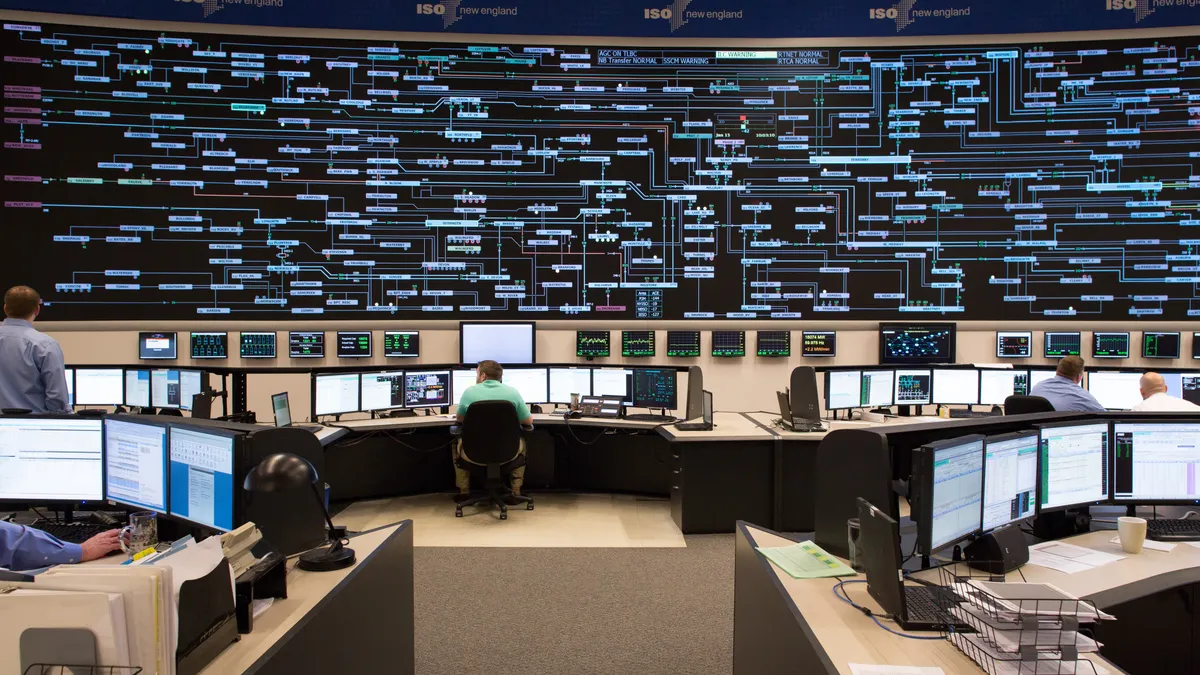Dive Brief:
- The New England grid operator and its stakeholder advisory group on Friday asked federal regulators to delay by one year the forward capacity auction, or FCA, scheduled for February 2025, in order to complete an assessment of capacity accreditation changes that will help ensure the region has sufficient energy supplies.
- ISO New England and the New England Power Pool’s Participants Committee asked the Federal Energy Regulatory Commission to approve the delay to FCA 19 by Jan. 2. The next auction, FCA 18, is scheduled for February and would not be impacted by the delay.
- In particular, the ISO and NEPOOL told regulators the capacity accreditation methodology “must be updated to capture the impact of the constrained natural gas delivery system on the ability of natural gas-fired resources to deliver energy during the winter.”
Dive Insight:
ISO New England and its stakeholders say they need more time to complete an ongoing Resource Capacity Accreditation project that will better model the region’s energy supplies and needs. The discovery of a modeling issue “has slowed the project’s completion,” the grid operator said.
The ISO began working with New England stakeholders in 2021 to develop a new Marginal Reliability Impact methodology for accrediting capacity resources, and had anticipated those reforms would be ready for FCA 19. Development of the MRI continued through the first part of this year but was paused “to evaluate certain issues discovered with the tools the ISO is using to model gas infrastructure constraints,” the ISO told FERC.
Those issues involved the tools the ISO is using to model gas infrastructure constraints for the calculation of capacity accreditation values, the grid operator said.
Progress on the MRI is continuing but the project cannot be completed in time for the scheduled FCA 19 in 2025.
Once complete, the ISO’s new modeling methodology will take into consideration resources’ operating characteristics, including maximum capability, intermittency, fuel limitations and forced outages, to determine their reliability contributions.
The grid operator is “equally concerned” with improving the accuracy of accreditation for both new and existing resources, according to Alan McBride, the ISO’s director of transmission services and resource qualification.
“The region is already experiencing a significant influx of new resources, as offshore wind, solar, and battery storage resources now comprise the vast majority of resources in New England’s Interconnection Queue,” McBride said in testimony filed with the request to delay FCA 19.
At the beginning of this year battery storage resources comprised 35% of new generation projects in the region’s queue, solar resources made up 12% and wind resources comprised about half new projects, McBride told FERC. However, between now and 2029 — which marks the end of the FCA 19 delivery period — battery storage resources are expected to comprise approximately 43% of the proposed projects in the queue, solar resources will made up approximately 15% and wind projects will be around 40%.
“These resources have the potential to add significant capacity to the region’s electricity system, with offshore wind making particularly notable contributions during the winter months when the existing gas infrastructure in New England is most constrained, and battery storage resources supplementing, and potentially replacing, other resources with stored fuels,” McBride said.
Gas constraints are a particular issue in New England winters. The region’s gas delivery system “faces significant constraints during the winter months, which can impede the ability of natural gas-fired generators to obtain fuel to operate, in particular during extended periods of cold weather,” the ISO told FERC.
“The current capacity accreditation methodology overvalues gas resources’ reliability contributions, which likely means that the region is over-relying on natural gas-fired generators to meet peak winter demand,” the grid operator said.















